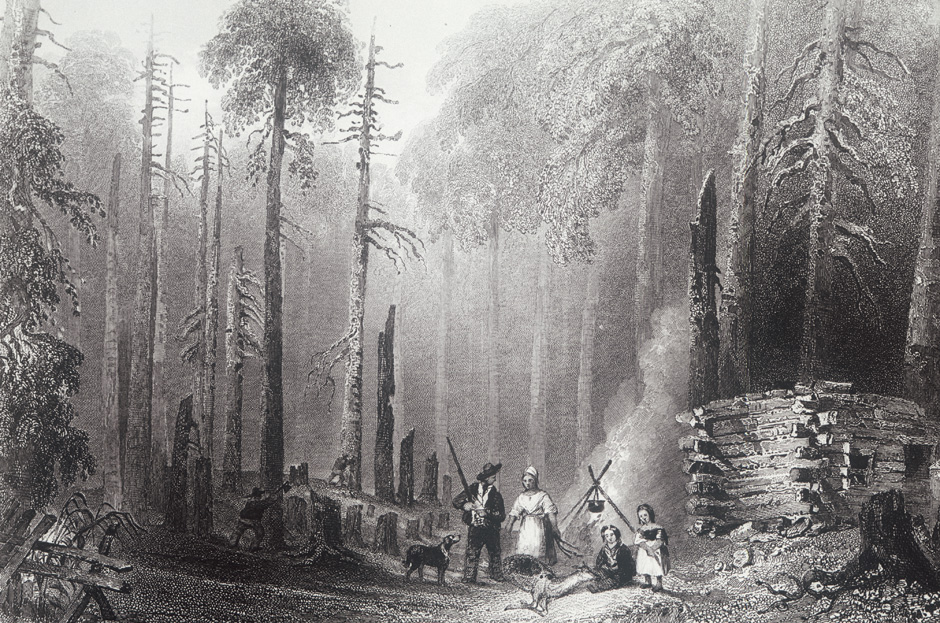
Moodie Farmsite 2
Lake Katchawanook
Our government grant was upon the lake shore, and Moodie had chosen for the site of his log house a bank that sloped gradually from the edge of the water, until it attained to the dignity of a hill. Along the top of this ridge, the forest road ran, and midway down the hill, our humble home, already nearly completed, stood, surrounded by the eternal forest. A few trees had been cleared in its immediate vicinity, just sufficient to allow the workmen to proceed, and to prevent the fall of any tree injuring the building, or the danger of its taking fire during the process of burning the fallow.
Early every morning, Moodie went off to the house; and the first fine day, my sister undertook to escort me through the wood, to inspect it. The proposal was joyfully accepted; and although I felt rather timid when I found myself with only my female companion in the vast forest, I kept my fears to myself, lest I should be laughed at.
It was in vain that my husband assured me that no person had ever been attacked by wild animals in the woods, that a child might traverse them even at night in safety; whilst I knew that wild animals existed in those woods, I could not believe him, and my fears on this head rather increased than diminished.
The snow had been so greatly decreased by the late thaw, that it had been converted into a coating of ice, which afforded a dangerous and slippery footing. My sister, who had resided for nearly twelve months in the woods, was provided for her walk with Indian moccasins, which rendered her quite independent; but I stumbled at every step. The sun shone brightly, the air was clear and invigorating, and, in spite of the treacherous ground and my foolish fears, I greatly enjoyed my first walk in the woods. Naturally of a cheerful, hopeful disposition, my sister was enthusiastic in her admiration of the woods. She drew such a lively picture of the charms of a summer residence in the forest that I began to feel greatly interested in her descriptions, and to rejoice that we, too, were to be her near neighbours and dwellers in the woods; and this circumstance not a little reconciled me to the change.
Hoping that my husband would derive an income equal to the one he had parted with from the investment of the price of his commission in the steam-boat stock, I felt no dread of want. Our legacy of 700 pounds had afforded us means to purchase land, build our house, and give out a large portion of land to be cleared, and, with a considerable sum of money still in hand, our prospects for the future were in no way discouraging.
When we reached the top of the ridge that overlooked our cot, my sister stopped, and pointed out a log-house among the trees. “There, Susanna,” she said, “is your home. When that black cedar-swamp is cleared away, that now hides the lake from us, you will have a very pretty view.” My conversation with her had quite altered the aspect of the country, and predisposed me to view things in the most favourable light. I found Moodie and Monaghan employed in piling up heaps of bush near the house, which they intended to burn off by hand previous to firing the rest of the fallow, to prevent any risk to the building from fire. The house was made of cedar logs, and presented a superior air of comfort to most dwellings of the same kind. The dimensions were thirty-six feet in length, and thirty-two in breadth, which gave us a nice parlour, a kitchen, and two small bed-rooms, which were divided by plank partitions. Pantry or store-room there was none; some rough shelves in the kitchen, and a deal cupboard in a corner of the parlour, being the extent of our accommodations in that way.
Susanna Moodie, Roughing It in the Bush (1852)